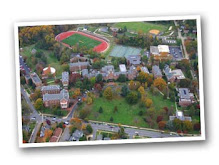
When my juniors entered the classroom for the second cycle of the College Seminar, I handed them a blank sheet of paper and a pencil.
Sitting down, I asked them to draw two pie charts.
The first chart involved them answering the question -
how do you spend your time now?The second chart involved them answering the question -
how do you want to spend your time in college?For many the first pie chart was cut in half.
Half was "Academics".
The other half was sliced into many different pieces.
From "Sports".
To "Theater".
From "Garage band".
To "Youth Group".
From "Dance".
To "Horse back riding".
Heck there were even pie slices for "Thunder games" and "Sleep".
The second pie charts, however, were the most interesting.
Some juniors drew charts that looked similar to their charts now.
But for most there were nuances.
For some "Academics" went from half to a quarter.
For many "Social" went from quarter to a half.
What's "Social" look like?, I asked the juniors.
Greek life.
Tailgating.
Concerts.
Parties.
Shopping.
Surfing.
Road tripping.
For many sports even fell under social.
It wasn't about competing to win as much as connecting to know/be known.
For those who haven't seen the Oscar award winning film,
The Social Network, it is a must see.
The film captures the spirit of a generation and helps us understand why kids are far more about social interactions/networks/webs than they are about anything else.
One junior confessed that she wanted a college where the "academics were challenging but not suffocating". She wanted room for more "spaciousness to enjoy friendships".
Quite revealing, don't you think?
Just last week
The Times did an article entitled
"College the Easy Way" on this trending issue among college-bound students. Worth the read.

Moving on to the next exercise, I had the juniors draw a stick figure of themselves, then a linear line across the page, and then another stick figure with a cap and gown on.
Above this drawing I had them write out this question:
"What do you hope to experience/do in college before you graduate?"To help my juniors think about what to put on that linear line, I mapped out with bullet points what I experienced in that bracket of time.
- played college basketball (on scholarship)
- lived in a major city with trains (Chi Town)
- lived in a dorm (three fellow b-ballers and my roommate from Minnesota)
- rode a bike instead of drove a car my freshman year
- had a girlfriend (her name was Amy...a different Amy than my bride)
- got season tickets for football (one year at OU...the Schnellenberger year...enough said)
- studied literature and education
- ate Lucky Charms three meals a day
- knew and was known by my professors (Dr. Grady and Dr. Washington)
- worked a couple job to pay the bills (bus driving/assistant coach)
- lived in a house off campus with a bunch of guys (405 Chautauqua Ave)
- road tripped over spring break (Panama City Beach 08')
- got an internship (student teaching at OCS)
- studied abroad (Regent College in Vancouver...does Canada qualify as abroad?
- wrote a mini-thesis (Tolkien and Lewis: The Christian Imagination)
- got a job (OCS)
- got into graduate school (UCO)
- graduated with minimal debt ($1500 total)
- bought my first car (silver, 1998 Honda CRV with 42K)
Parents then - don't be afraid to ask your student this question. It really can corkscrew open conversation about what your students desires to get out of those four years.
Because in the end, college is an experience.Think about what you (parents) remember about college.
Is it really that lab on Friday afternoons?
Or that Pulitzer winning professor?
Or nights curled up with your textbooks at midnight?
Or are the memories you hold dear about moments with people you formed a bond with through mutual experiences?
Certainly there was that professor who helped awaken in me latent desires and gifts.
Dr. Grady comes to mind. His American II class was a turning point for me academically and professionally.
But for the most part, my memories are rife with moments like...
playing Spades with teammates for a penny a point on road trips,
running button hooks on the sugary sands of Florida in a tackle football game with 10 fellas over spring break,
and building a Mountain Dew wall in the Chautauqua house (1076 Mountain Dew cans total).
At
Elon, there is a tradition that when a student graduates, they not only get a
diploma but they get a
resume of all that they have done, experienced, and accomplished during their years there.
Pie charts and sketches.
It's a place to begin.
















